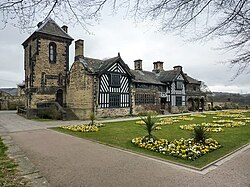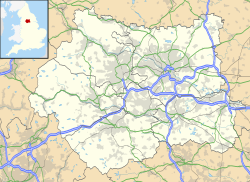Shibden Hall
 Shibden Hall in 2010 | |
| Established | 1420 |
|---|---|
| Location | Lister's Road, Halifax, West Yorkshire, England HX3 6XG |
| Coordinates | 53°43′41.7″N 1°50′24″W / 53.728250°N 1.84000°W |
| Type | Historic house museum |
| Website | Shibden Hall |
Listed Building – Grade II* | |
| Official name | Shibden Hall |
| Designated | 3 November 1954 |
| Reference no. | 1254036 |
Shibden Hall is a Grade II* listed historic house located in a public park at Shibden, West Yorkshire, England. The building has been extensively modified from its original design by generations of residents, although its Tudor half-timbered frontage remains its most recognisable feature.
One of its most notable residents was Anne Lister who inherited the hall from a relative. Lister has been described as being the "first modern lesbian" due to her "love... [of] the fairer sex" that she documented in her diaries.[1]
History
[edit]The hall dates back to around 1420 when it was recorded as being inhabited by one William Otes.[2] Before 1612, the estate was owned by the Savile and Waterhouse families. The three families' armorial symbols are recorded in a stone-mullioned 20-light window at the hall.[3] The property was acquired in 1612 on behalf of John Hemingway, who died young, and it was inherited in 1619 by Hemingway's uncle, Samuel Lister.[4]
For more than 300 years (1619 to 1926), the Shibden estate was in the hands of the Lister family who were wealthy mill owners and cloth merchants. Its most famous resident was Anne Lister (1791–1840) who became sole owner of the hall after the death of her aunt. In 1830, she commissioned York architect John Harper and landscape gardener Samuel Gray to make extensive improvements to the house and grounds. A gothic tower was added to the building for use as a library, and the major features of the park were created, including terraced gardens, rock gardens, cascades and a boating lake.[5] A "Paisley shawl" garden designed for the terrace by Joshua Major was added in the 1850s. After Anne Lister's death in 1840, the estate passed to her partner Ann Walker, who died in 1854; ownership then returned to the Lister family. When John Lister experienced financial difficulties, Arthur McCrea took over the mortgages and subsequently donated the hall to Halifax Corporation,[6] which opened it as a museum in 1934.[2] The estate became a public park in 1926, and the hall a museum in 1934.[4]
The property has been a Grade II* listed building since 3 November 1954.[6] The park and gardens were restored between 2007 and 2008 with almost £3.9 million from the Heritage Lottery Fund and £1.2 million from Calderdale Council.[7] The gardens were listed Grade II on 27 June 2000.[8]
The hall is currently open to the public, the West Yorkshire Folk Museum being housed in an adjoining barn and farm buildings. The hall has a variety of restored workshops, including a brewery, a basket-weaving shop, a tannery, a stable and an extensive collection of horse-drawn carriages. The park also contains a dry stone walling exhibition, a children's play area, and a miniature steam railway.[9][10]
The hall was used for filming the 2018 British historical drama Peterloo and the 2019/2022 BBC/HBO television series Gentleman Jack, which is based on the former owner Anne Lister.[11][12] The television series attracted almost six million viewers each week and, as a result, the hall saw a trebling of visitors, leading Calderdale Council to plan an extension of the opening times.[13]
The music room contains a square piano made by John Pohlman; dated 1769, it is one of Pohlman's earliest. The piano is unrestored, though its stand is of a later date.[14]
Gallery
[edit]-
Shibden Hall in May 1995
-
Shibden Hall Gatehouse
-
Side view of Shibden Hall with gothic tower in foreground
-
Shibden Hall terrace during refurbishments, May 2008
-
Shibden Hall in May 2009
-
Shibden Hall from the park walkways
-
Rear of Shibden Hall
-
Rear courtyard with stables and outbuildings to the left
-
Craft workshops
-
Hearse housed at Shibden Hall
-
The Town Chariot and the Vardo
-
The Lister Lion stone sculpture
See also
[edit]References
[edit]- ^ Woods, Rebecca (3 May 2019). "The Life and Loves of Anne Lister". BBC News. Archived from the original on 25 June 2024. Retrieved 10 June 2019.
- ^ a b "Shibden Hall, Halifax". BBC History Magazine. BBC. 4 September 2012. Archived from the original on 30 June 2022. Retrieved 22 May 2022.
- ^ "Shibden Hall: Introduction". Calderdale Council. Archived from the original on 11 August 2013.
- ^ a b "Lister Family of Shibden Hall". West Yorkshire Archive Service. Archived from the original on 12 May 2023. Retrieved 10 April 2022.
- ^ "Shibden Park: The landscape". Calderdale Council. Archived from the original on 28 August 2008.
- ^ a b Historic England (27 June 2000). "Shibden Hall (Grade II*) (1254036)". National Heritage List for England. Retrieved 27 September 2019.
- ^ "Shibden Park: The restoration project". Calderdale Council. Archived from the original on 25 July 2008.
- ^ Historic England (27 June 2000). "Shibden Hall (Grade II) (1001470)". National Heritage List for England. Retrieved 6 January 2019.
- ^ "Shibden Miniature Railway | Britain's Great Little Railways". Britain's Great Little Railways. Archived from the original on 7 February 2020. Retrieved 6 January 2019.
- ^ "Shibden Park". Calderdale Council. 5 August 2024. Archived from the original on 7 January 2019.
- ^ Hirst, Ian (17 April 2018). "Shibden Hall to close for 17 weeks as filming begins for Sally Wainwright drama". The Halifax Courier. Archived from the original on 17 November 2019. Retrieved 6 January 2019.
- ^ "Shibden Hall". screenyorkshire.co.uk. Archived from the original on 16 July 2023. Retrieved 6 January 2019.
- ^ "Gentleman Jack: Anne Lister's Shibden Hall extends hours". BBC News. 21 July 2019. Archived from the original on 24 September 2022. Retrieved 21 July 2019.
- ^ "Johannes Pohlman piano maker". squarepianos.com. Archived from the original on 14 February 2024. Retrieved 6 October 2019.
Bibliography
[edit]- Hanson, T. W. (1934). A Short History of Shibden Hall. County Borough of Halifax/William Patterson Printers. 32pp.
External links
[edit]- The Restoration and Enhancement of Shibden Park at Landscape Institute Yorkshire & Humber Branch
- 1420s establishments in England
- Buildings and structures in Halifax, West Yorkshire
- Country houses in West Yorkshire
- Gardens in West Yorkshire
- Grade II* listed buildings in West Yorkshire
- Grade II listed parks and gardens in West Yorkshire
- Historic house museums in West Yorkshire
- LGBTQ history in England
- Museums in Halifax, West Yorkshire
- Timber framed buildings in Yorkshire
- Lister family
- Hall houses













